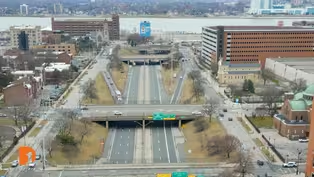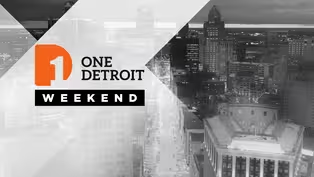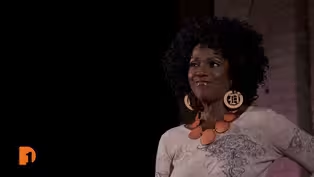
National Arab Orchestra brings music to Concert of Colors
Clip: Season 8 Episode 2 | 6m 31sVideo has Closed Captions
National Arab Orchestra brings music to Concert of Colors
The world-renowned National Arab Orchestra returns to Concert of Colors for its second year. Ahead of the orchestra’s performance, One Detroit contributor Cecelia Sharpe of 90.9 WRCJ sat down with Orchestra Founder and Music Director Michael Ibrahim to talk about their second Concert of Colors performance and the importance of uniting communities through global music.
Problems playing video? | Closed Captioning Feedback
Problems playing video? | Closed Captioning Feedback
One Detroit is a local public television program presented by Detroit PBS

National Arab Orchestra brings music to Concert of Colors
Clip: Season 8 Episode 2 | 6m 31sVideo has Closed Captions
The world-renowned National Arab Orchestra returns to Concert of Colors for its second year. Ahead of the orchestra’s performance, One Detroit contributor Cecelia Sharpe of 90.9 WRCJ sat down with Orchestra Founder and Music Director Michael Ibrahim to talk about their second Concert of Colors performance and the importance of uniting communities through global music.
Problems playing video? | Closed Captioning Feedback
How to Watch One Detroit
One Detroit is available to stream on pbs.org and the free PBS App, available on iPhone, Apple TV, Android TV, Android smartphones, Amazon Fire TV, Amazon Fire Tablet, Roku, Samsung Smart TV, and Vizio.
Providing Support for PBS.org
Learn Moreabout PBS online sponsorship(bass transition music) (Indian oud music) - Michael, you are a musician, composer, educator, Kresge Fellow and founder of the National Arab Orchestra.
Thank you so much for coming, taking time out of your busy schedule to talk to me today.
- Thank you.
Wonderful to be here.
- Before we jump into the Concert of Colors, you started off playing the oud.
How did your musical adventure unfold?
- (chuckles) You know, when I was a kid, my parents would take us to church.
We grew up Greek Orthodox.
And I would just remember listening to my grandfather chant.
He was the priest at the church down in Berkley, Michigan.
And I just remember those sounds really sticking in my ear.
So I got fascinated into those sounds and my dad had an oud at the house.
He couldn't play, he just kinda strummed on the instrument.
But I got really fascinated with it.
And it wasn't until after my last trip to Syria in the '90s.
I came back and I really wanted to learn.
So they got me an oud and I started taking lessons with the local cat in town.
And from there it's just been kind of this cultural journey of discovery.
- You've committed to it ever since.
- Yeah.
I mean I kind of got away from it.
- Did you?
What did you do?
- Well when I got into high school they asked me what I wanted to do and I was like can I play oud in the orchestra?
They're like no, but here's a saxophone.
So I got into western music.
And then I went to school with the intent of getting a Music Ed degree.
So when I got to my undergrad, that's when I really started to have this cultural reawakening and I started to express that through Arab music.
- [Cecelia] You founded the National Arab Orchestra in 2009.
What prompted that?
- I got a call from somebody at U of M. Alison Jones.
And she wanted to restart an ensemble that was there and I was a part of it.
And it kind of went on hiatus for about a year, a year and a half.
And she asked me to take it over so we started from scratch, we held auditions, we got in students, and so this whole thing started as a student group at U of M. It wasn't until the second concert I did the following year.
And I saw how excited community members from the Arab American community were.
That's when I took it upon myself, I borrowed money from my dad and I started the nonprofit and from there I started to get board members and then we started the NAO.
Started off as the Michigan Arab Orchestra.
And in 2014 we changed to the National Arab Orchestra.
(Indian oud music) - Since you started the orchestra in 2009 you added an ensemble, the Takht Ensemble.
You've added school programming.
You really seek to introduce Arab culture to audiences through music.
What do you hope that audiences learn from their experience?
- I hope that Arab American kids will be able to use this platform as a way for them to get in touch with their culture.
Kind of like how I did.
For the non-Arabs, we hope to create opportunities for people to understand the culture better.
'Cause, you know, what people hear on the news is one thing.
And what the reality of a culture is is another.
- I remember I met you at Detroit School of Arts and you did a residency with the orchestra students there.
And they were kind of taken aback.
(Michael laughs) - By the idea of playing non-western music on their instruments.
- It's always a joy to do programs like that with students.
Because you can see the transformation that takes place.
And it's always the same cycle of events.
Whenever I first walk into a new school they're like what's going on?
- Yeah.
- And then once they get used to me and they get comfortable, then they start working on the music.
Then they learn more about the culture.
Then when they get to the performance they're ready and they're excited cause they know they're gonna be singing with like a 30 piece orchestra.
And then afterwards they feel really good.
You know, the more we do programs like this the more we see how much the arts can impact especially in the realm of education and in bringing people together.
- You're preparing for the upcoming Concert of Colors.
Why is it so important for the National Arab Orchestra to be a part of this upcoming Concert of Colors?
- Well Concert of Colors is a world music festival.
And the NAO is one of the leading figures of world arts in Detroit.
You know, it's an institution that not only performs in Michigan, but it goes all over the country.
The fact that we get to represent Arab culture in that form is important.
We're also really really excited to be working and partnering again with the Detroit Symphony Orchestra to put this on.
And I'm really excited about this particular program 'cause we're bringing an amazing jazz legend, Yehia Khalill.
He was credited with actually bringing jazz to Egypt.
The Arab world is so diverse and there's so much different beauty depending on the region you're in, so there's a lot to cover there.
(solo violin music) (Indian oud music)
Can the I-375 redevelopment right past racial wrongs
Video has Closed Captions
Clip: S8 Ep2 | 6m 30s | Will MDOT’s I-375 Redevelopment Project restore a once thriving Black corridor in Detroit? (6m 30s)
One Detroit Weekend: July 14, 2023
Video has Closed Captions
Clip: S8 Ep2 | 1m 54s | Check out what you can do around metro Detroit this weekend on “One Detroit Weekend.” (1m 54s)
Satori Shakoor’s ‘Confessions of a Menopausal Femme Fatale’
Video has Closed Captions
Clip: S8 Ep2 | 6m 54s | ‘Confessions of a Menopausal Femme Fatale’ takes candid, comedic approach to female aging. (6m 54s)
Providing Support for PBS.org
Learn Moreabout PBS online sponsorship
- News and Public Affairs

Top journalists deliver compelling original analysis of the hour's headlines.

- News and Public Affairs

FRONTLINE is investigative journalism that questions, explains and changes our world.












Support for PBS provided by:
One Detroit is a local public television program presented by Detroit PBS


